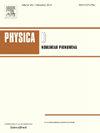基于Res-KAN积分稀疏回归的变系数控制方程提取与重构
IF 2.9
3区 数学
Q1 MATHEMATICS, APPLIED
引用次数: 0
摘要
复杂系统控制方程的提取在科学发现和工程应用中起着至关重要的作用。以往的研究通常集中在控制方程的静态特性上,而现实世界的动力学涉及影响系统行为的复杂、不断变化的因素。这项工作提出了一种新的方法,将单层Kolmogorov-Arnold网络(KANs)集成到物理信息神经网络(pinn)的下游操作中,并结合使用稀疏回归算法的交替训练策略。与传统方法不同的是,该方法仅依靠稀疏数据,不需要任何先验知识,即可重建控制方程的精确形式,同时识别单变量的变系数函数。通过对KAN层的样条函数进行符号化,还可以推导出这些系数函数的精确表达式,揭示出具有实际物理意义的关键参数。此外,当将框架扩展到高维问题时,KAN的正则化实现了权稀疏性,从而消除了冗余神经元并优化了网络。在各种基准问题上的实验证明了该方法对不同程度的数据稀疏性和噪声的鲁棒性,为控制方程的重建和分析提供了一种新的解决方案。本文章由计算机程序翻译,如有差异,请以英文原文为准。
Extraction and reconstruction of variable-coefficient governing equations using Res-KAN integrating sparse regression
Extracting the governing equations for complex systems plays a crucial role in scientific discovery and engineering applications. Previous research often focus on static properties of governing equations, while real-world dynamics involve complex, evolving factors that influence the system behavior. This work proposes a novel approach that integrates the single-layer Kolmogorov-Arnold networks (KANs) in the downstream operations of physics-informed neural networks (PINNs), combined with an alternating training strategy using sparse regression algorithms. Different from the traditional methods, this approach relies solely on sparse data, without any prior knowledge, to reconstruct precise form of governing equations and simultaneously identify the variable-coefficient functions depending on single variables. By symbolizing the spline functions in the KAN layer, it can also derive the exact expressions of these coefficient functions and reveal the key parameters of real physical significance. Furthermore, when extending the framework to high-dimensional problems, KAN’s regularization enables weight sparsity enforcement, which removes redundant neurons and optimizes the network. Experiments on various benchmark problems demonstrate the robustness of our method to varying levels of data sparsity and noise, offering a new solution to the reconstruction and analysis of the governing equations.
求助全文
通过发布文献求助,成功后即可免费获取论文全文。
去求助
来源期刊

Physica D: Nonlinear Phenomena
物理-物理:数学物理
CiteScore
7.30
自引率
7.50%
发文量
213
审稿时长
65 days
期刊介绍:
Physica D (Nonlinear Phenomena) publishes research and review articles reporting on experimental and theoretical works, techniques and ideas that advance the understanding of nonlinear phenomena. Topics encompass wave motion in physical, chemical and biological systems; physical or biological phenomena governed by nonlinear field equations, including hydrodynamics and turbulence; pattern formation and cooperative phenomena; instability, bifurcations, chaos, and space-time disorder; integrable/Hamiltonian systems; asymptotic analysis and, more generally, mathematical methods for nonlinear systems.
 求助内容:
求助内容: 应助结果提醒方式:
应助结果提醒方式:


